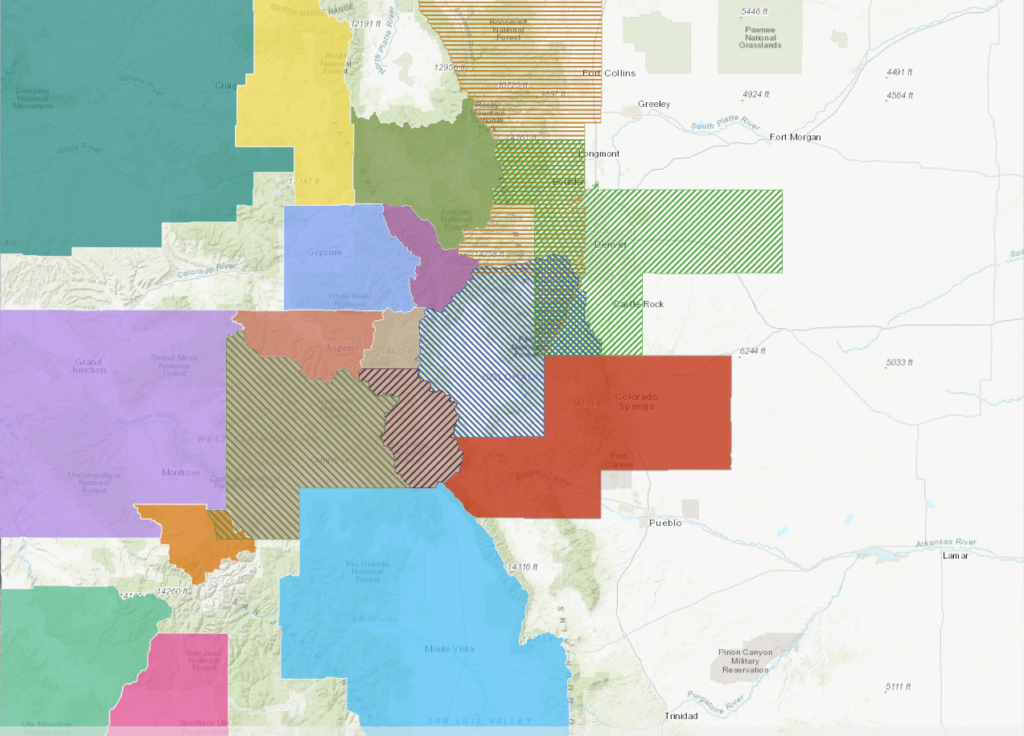Bringing people together to find collaborative solutions to common problems can feel like pitching a small tent in a hostile environment. Inside the warm container of a coalition, norms of trust and reciprocity foster commitment and mutual support. But moving outside that collaborative space means facing the cold winds of competition, polarization, and fragmentation. Knowing that coalitions are often limited in their focus and size to maintain their integrity, the challenge of achieving large-scale change can often leave community change agents feeling lost in the wilderness.
What if it were possible to build a structure that allowed us to maintain the warmth of connection and trust across broader sectors of our society? That is exactly what the Colorado Outdoor Regional Partnerships Initiative (RPI) is attempting to do. Comprised of 16 regional networks covering half the state, RPI brings together local conservation and recreation efforts to advance a common goal of “ensuring that Colorado’s land, water, and wildlife thrive while also providing for equitable and quality outdoor recreation experiences.” RPI is supported by dedicated funds from Great Outdoor Colorado (GOCO) and Colorado Parks and Wildlife (CPW), which enables regional partnerships to develop strategic plans, shared data, and long-term projects to advance the collective vision. To date, over $3 Million has been distributed through the program, creating a strong overarching framework of collaboration across the state.
This statewide partnership is essentially a “network of networks,” or a big tent within which the smaller regional tents are contained to help ensure a collaborative climate is maintained both within and across the regional networks themselves. This approach provides helpful guidance to anyone interested in scaling collaborative work because although the RPI was officially launched through an Executive Order from Governor Polis in 2020, it would not have taken deep root if it were just a top-down mandate. Instead, it grew out of the organic collaboration of the Colorado Outdoor Partnership (CO-OP), a statewide collaborative of private and public sector outdoors leaders who came together in 2016 to address the growing pressures that were being placed on the natural environment from the diverse interests of agriculture, recreation, conservation and game sports. Members of the CO-OP could sense that the friction between these diverse interests would lead to growing conflicts if they couldn’t find a path toward collaboration.
Equally important to the evolution of RPI is the success of several local coalitions that helped provide a proof of concept of what could be done through the power of collaboration at the local level. Beginning in 2017, the Civic Canopy was fortunate to be involved with three of the early examples of successful coalitions: Envision Chaffee County, San Luis Valley Great Outdoors (SLV GO!), and Metro Denver Nature Alliance (Metro DNA). In each of these cases, the Canopy team supported the local partners through a “launch sequence” rooted in the Community Learning Model to help develop a shared vision, measurable results, clear action plans, and a culture of collaboration to maintain momentum over time. Given this early history with the regional partnership work, the Canopy was then invited to give a keynote address to the full network of regional partners at their annual conference in April 2023. While the focus of the presentation was a synthesis of the research on best practices in collaboration that helped launch several of the regional networks, the true lesson of the moment was how effective collaboration evolves like healthy natural systems, scaling upward to successive levels of connection.
While still relatively new in its evolution, the Regional Partnership Initiative offers a powerful model for how systems can change through grassroots collaboration evolving upward to statewide infrastructure, and how that statewide profile can help provide the resources needed to nourish the local roots. This combination of local ties and statewide reach provides a dynamic vehicle for mobilizing large-scale change—a valuable asset Colorado desperately needs given the many pressures our natural environment faces. Hopefully, RPI can serve as a model for others seeking to mobilize large-scale change.


